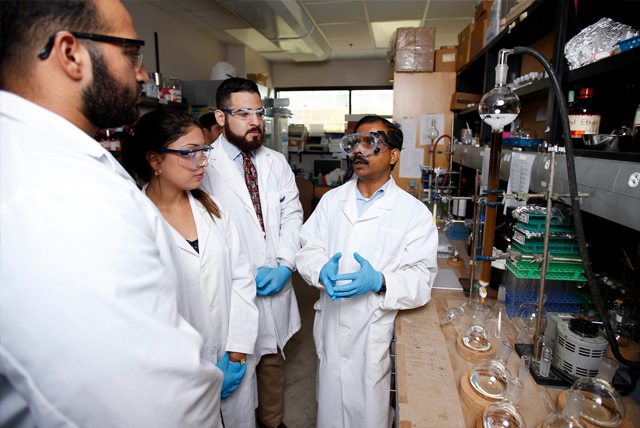Document Type
Article
Publication Date
4-2020
Abstract
Pseudomonas aeruginosa has a high potential for developing resistance to multiple antibiotics. The gene (glnS) encoding glutaminyl-tRNA synthetase (GlnRS) from P. aeruginosa was cloned and the resulting protein characterized. GlnRS was kinetically evaluated and the KM and kcatobs , governing interactions with tRNA, were 1.0 μM and 0.15 s-1 , respectively. The crystal structure of the α2 form of P. aeruginosa GlnRS was solved to 1.9 Å resolution. The amino acid sequence and structure of P. aeruginosa GlnRS were analyzed and compared to that of GlnRS from Escherichia coli. Amino acids that interact with ATP, glutamine, and tRNA are well conserved and structure overlays indicate that both GlnRS proteins conform to a similar three-dimensional structure. GlnRS was developed into a screening platform using scintillation proximity assay technology and used to screen ~2,000 chemical compounds. Three inhibitory compounds were identified and analyzed for enzymatic inhibition as well as minimum inhibitory concentrations against clinically relevant bacterial strains. Two of the compounds, BM02E04 and BM04H03, were selected for further studies. These compounds displayed broad-spectrum antibacterial activity and exhibited moderate inhibitory activity against mutant efflux deficient strains of P. aeruginosa and E. coli. Growth of wild-type strains was unaffected, indicating that efflux was likely responsible for the lack of sensitivity. The global mode of action was determined using time-kill kinetics. BM04H03 did not inhibit the growth of human cell cultures at any concentration and BM02E04 only inhibit cultures at the highest concentration tested (400 μg/ml). In conclusion, GlnRS from P. aeruginosa is shown to have a structure similar to that of E. coli GlnRS and two natural product compounds were identified as inhibitors of P. aeruginosa GlnRS with the potential for utility as lead candidates in antibacterial drug development in a time of increased antibiotic resistance.
Recommended Citation
Escamilla, Y., Hughes, C. A., Abendroth, J., Dranow, D. M., Balboa, S., Dean, F. B., & Bullard, J. M. (2020). Glutaminyl-tRNA Synthetase from Pseudomonas aeruginosa: Characterization, structure, and development as a screening platform. Protein science : a publication of the Protein Society, 29(4), 905–918. https://doi.org/10.1002/pro.3800
Publication Title
Protein science
DOI
10.1002/pro.3800



Comments
© 2019 The Protein Society. Original published version available at
https://doi.org/10.1002/pro.3800